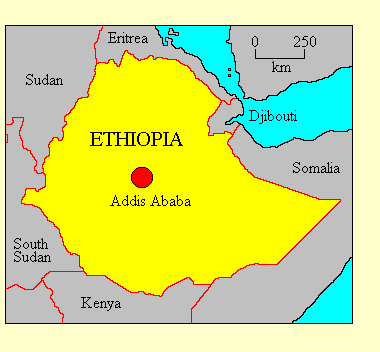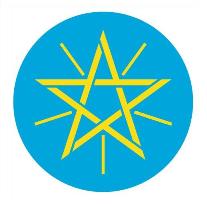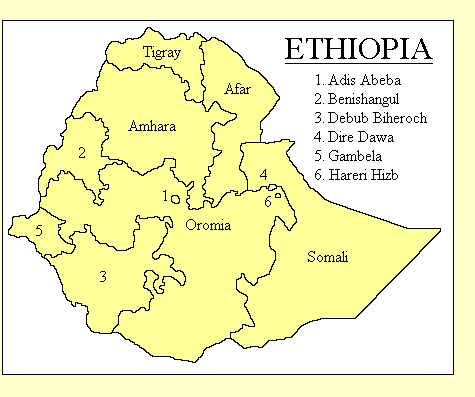

FEDERAL DEMOCRATIC REPUBLIC OF ETHIOPIA
• Official name: Ityop'iya Federalawi Demokrasiyawi Ripeblik (Federal
Democratic Republic of Ethiopia)
• Location: East Africa
• International organisations: African, Caribbean and Pacific Group of States, African Union, Non-Aligned
Movement, United Nations, World Trade Organisation.
• Borders: Djibouti, Eritrea, Kenya, Somalia, South Sudan, Sudan
• Coastline: None
• Land area: 1,127,127 Km2
• Population: 67,600,000
• Annual GDP (PPP) per capita: US$900 (2009 CIA estimate). World ranking: 179
• Ethnicity: Oromo 40%, Amhara and Tigre 32%, Sidamo 9%, Shankella 6%, Somali 6%, Afar 4%, Gurage 2%, other 1%
• Languages: Amharic is the official langauge, but is spoken as a first language by only 29.0% of the population. Other
languages are Oromo 28.5%, Tigrigna 5.4%, Somali 5.3%, Gurage 3.1% and Sidamo 3.1%. English is increasingly widely used.
• Religion: Sunni Moslem 45%-50%, Ethiopian Orthodox Christian
35%-40%, animist 12%

• Form of government: Federal democratic republic. Ethiopia is divided into nine states and two districts.
• Capital: Addis Ababa (Adis Abeba)
• Constitution: The
Constitution of theFederal Democratic Republic of Ethiopia came into effect on 22 August 1995.
• Head of state: The President is elected by the House of People's
Representatives for a six-year term. President
Girma Wolde-Giorgis
was elected on 8 October 2001. The President's functions are largely ceremonial.
• Head of government: The Prime Minister is appointed by the
President. The Prime Minister is the leader of the majority party in
the legislature, and is accountable to it.
• Legislature: The Federal Parliamentary Assembly is a bicameral legislature. The Council of People's
Representatives (Yehizbtewekayoch Mekir Bet) has 527 members, elected for five-year
terms from single-member constituencies. The Council of the Federation (Yefedereshn
Mekir Bet) has 117 members, chosen by the regional councils. The Parliament no longer has a website.
• Electoral authority: National elections are conducted by the
National Election Board of Ethiopia.
• Freedom House 2011 rating: Political Rights 6, Civil Liberties 6
• Transparency International Corruption Index: 27% (116 of 178 countries rated)
• Reporters Without Borders Press Freedom 2010 Index: 50.6% (139 of 178 countries rated)
• Heritage Foundation Economic Freedom 2010 Index: 50.5% (144 of 178 countries rated)
Political history
The ancient African Christian state of Ethiopia was an absolute monarchy before
1935, when it was invaded and occupied by Italy. The Emperor Haile Selassie was restored
to his throne by the Allies in 1941, and embarked on a program of modernisation. In 1955 he
established a legislature with a lower house elected by universal suffrage. Like many
modernising monarchs, however, Haile Selassie wanted both to establish democracy and
to retain power in his own hands, and he remained the real ruler of the country.

Increasing economic difficulties and famine led to riots in 1974, and in September
an army coup deposed the Emperor (he was later murdered) and established a military regime.
In 1975 a Marxist group seized power and established a Communist state led from 1977 by
Lt-Col Haile Miriam Mengistu. Strong resistance within the country was defeated with
the aid of Cuban troops.
The nationalisation of agriculture and endless wars with secessionist groups and
with neighboring Somalia predictably led to famine in the 1980s, and in 1990 the regime,
deprived of Soviet aid, collapsed. The
Ethiopian People's Revolutionary Democratic
Front (EPRDF), a coalition of ethnic rebels and democrats, came to power and
Meles Zenawi became
acting prime minister in July 1991. At the same time Ethiopia was forced to accept the
independence of Eritrea.
The new Ethiopian constitution divided the country into ethnic-based provinces,
and devolved considerable responsibility to them. The central government has a bicameral
legislature elected by universal suffrage and a multi-party system. But Meles Zenawi
has remained in power and has concentrated power in his own hands. Opposition groups
accuse him of establishing a dictatorship. Nevertheless, elections were held in 2005 at which the opposition
Coalition for Unity and Democracy (CDU) and United Ethiopian Democratic Forces made considerable gains. These elections
were followed by serious disturbances which led to a crackdown
by the government, including the arrest of many CDU activists. By the time of the 2010 election, the
government had strengthened its control of the state machinery and the media, and the opposition was prevented from
campaigning effectively and lost almost all its seats. Ethiopia cannot now be classed as a democracy.
Freedom House's 2011 report on Ethiopia
says: "Ethiopia is not an electoral democracy... Corruption is a significant problem in Ethiopia. According to the Heritage
Foundation's Index of Economic Freedom, EPRDF officials receive preferential access to credit, land leases, and jobs.
The news media are dominated by state-owned broadcasters and government-oriented newspapers...
Academic freedom is restricted. The prime minister has accused universities of being friendly to the opposition, and their
activities are closely monitored... Freedoms of assembly and association are guaranteed by the constitution but limited in
practice, as street demonstrations have been banned since 2005... During the 2010 election campaign, police routinely broke up
political rallies and meetings organized by the opposition... The judiciary is officially independent, but its judgments rarely
deviate from government policy... The government has tended to favor Tigrayan ethnic interests in economic and political matters."
Updated November 2011
|


